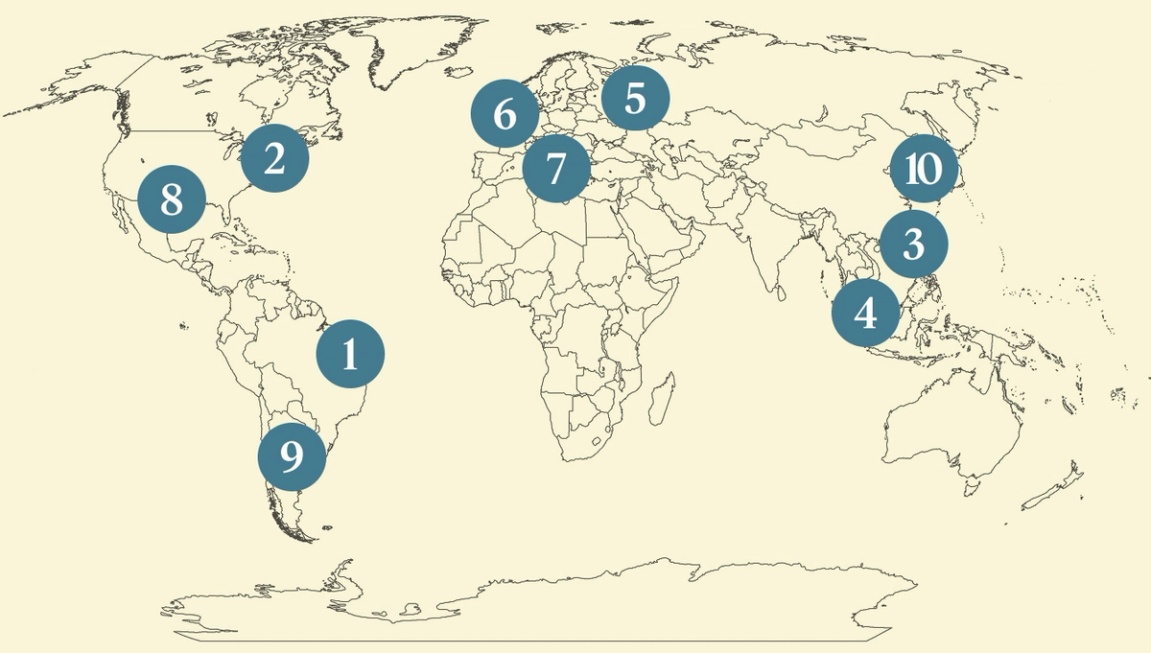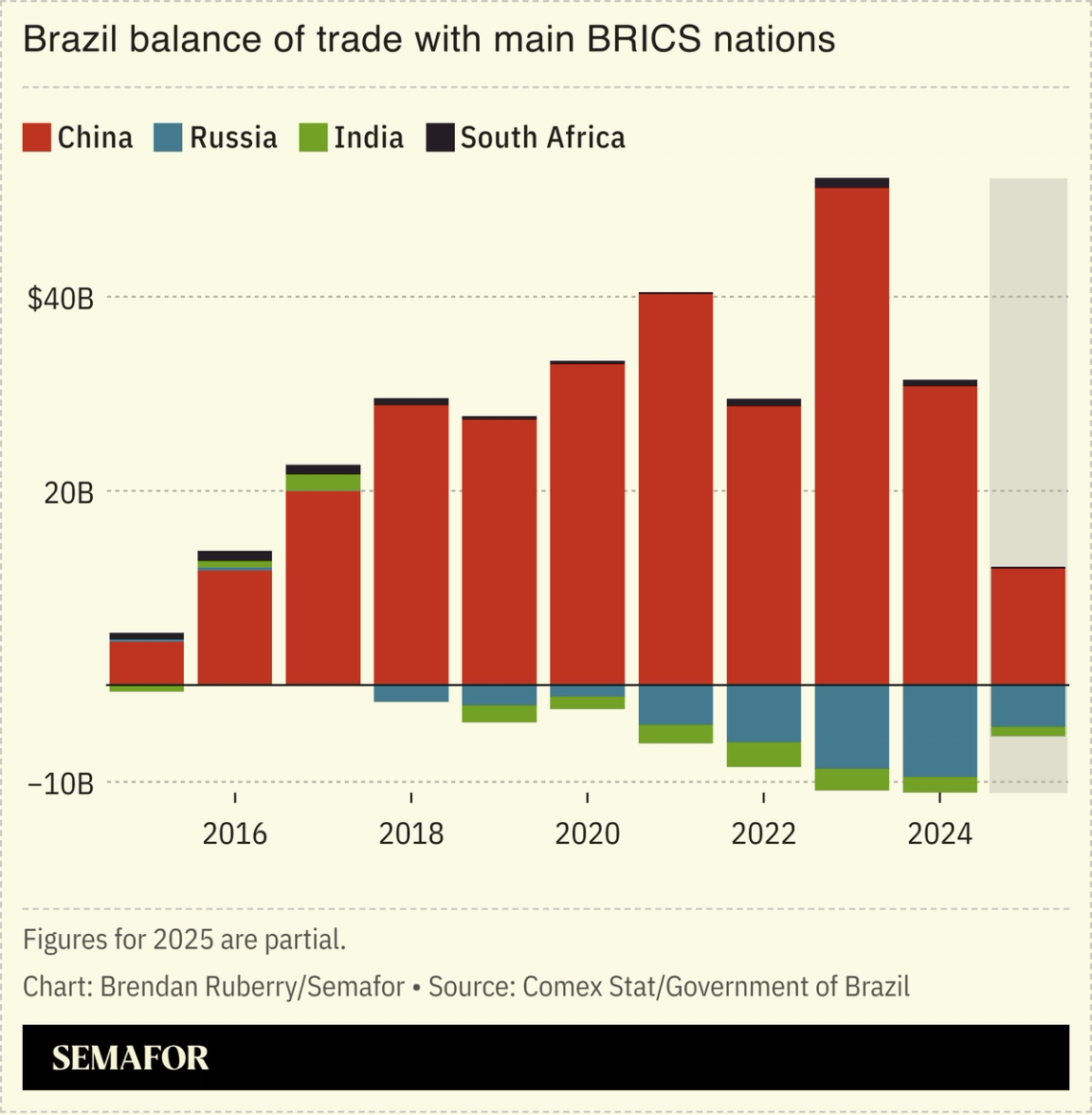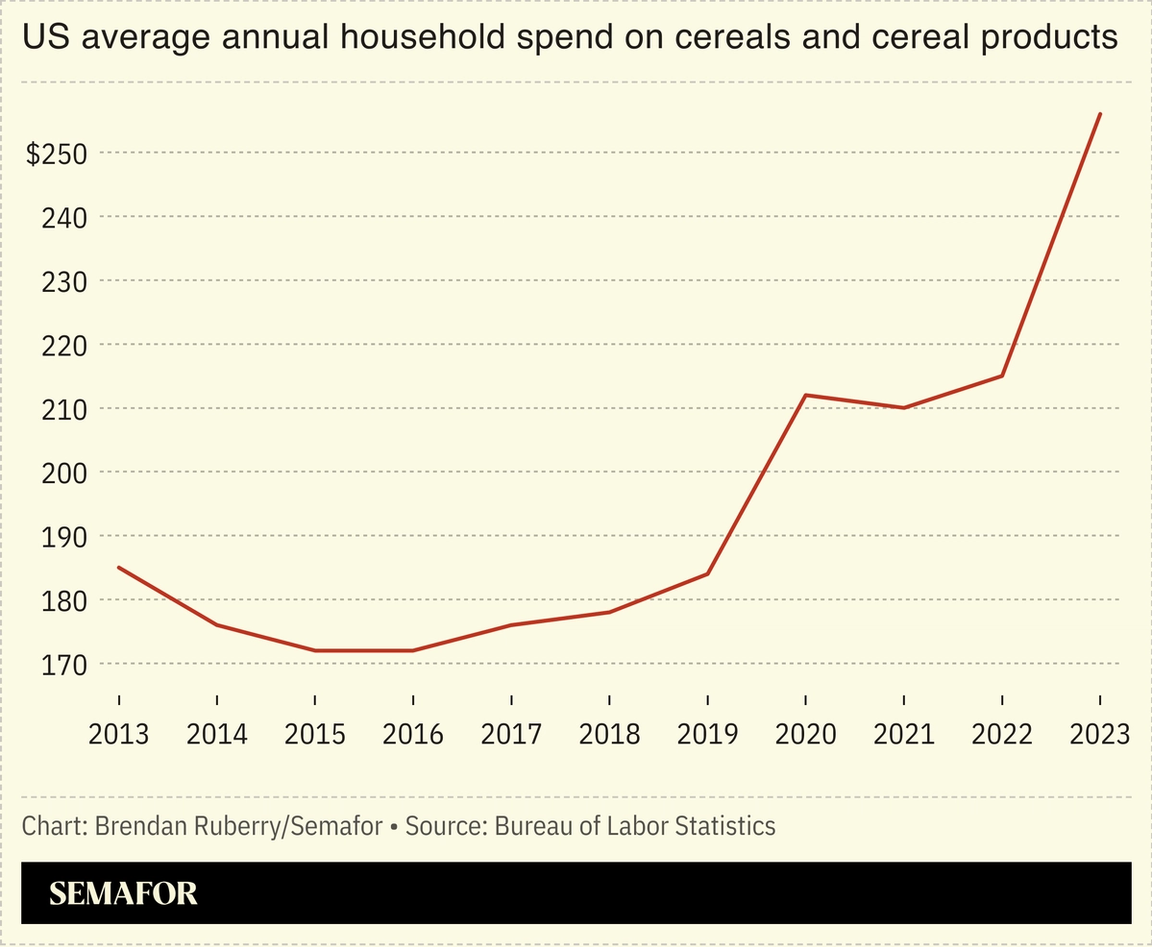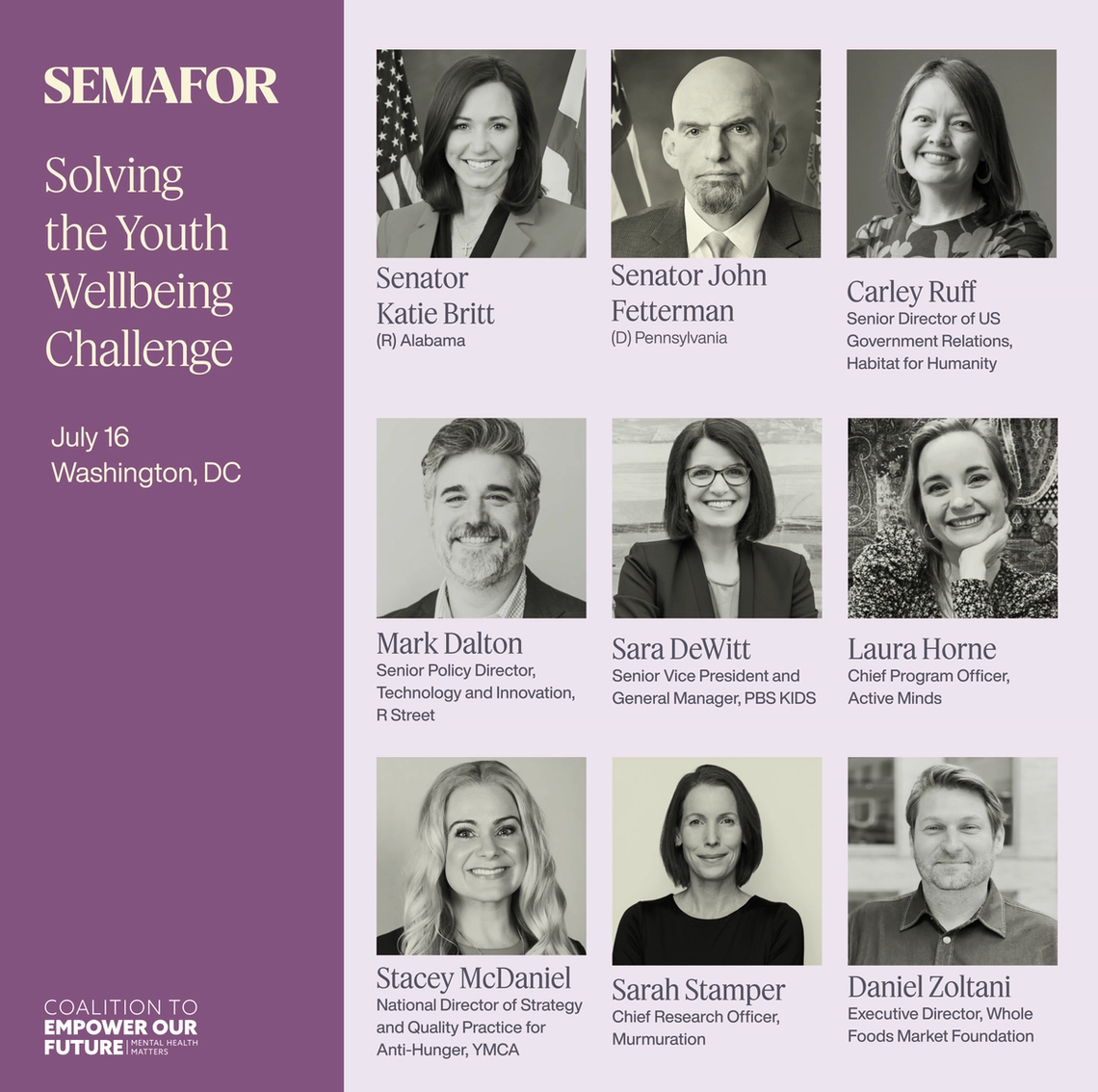| | US tariffs distort global trade patterns, Taiwan looks to Ukraine for wartime lessons, and a new cla͏ ͏ ͏ ͏ ͏ ͏ |
| |   ROSTOV-ON-DON ROSTOV-ON-DON |   ULAANBAATAR ULAANBAATAR |   KUALA LUMPUR KUALA LUMPUR |
 | Flagship |  |
| |
|
The World Today |  - Global trade distortions
- US rare earth investment
- Kyiv’s lessons for Taiwan
- ‘Frank’ US-Russia talks
- Russian sabotage campaign
- The West restricts immigration
- Candy-meets-cereal deal
- Disaster alert debate
- Polo’s cloning scandal
- Pop stars who don’t exist
 The original Birkin bag sells at auction for millions. |
|
Tariffs distort trade patterns |
 US tariffs are distorting global trade patterns and diplomatic ties in ways that will likely outlast President Donald Trump’s tenure, analysts said. Trump’s latest threat of 50% duties on Brazil — a rate Brasília said it would match — risks roiling commodity markets, with the country having to find new buyers for goods like coffee and beef, Bloomberg reported. Brazil was already forging fresh relationships before Trump’s latest salvo, vowing to double trade with India. Elsewhere, Southeast Asian nations touted closer economic ties with China, while Beijing and the European Union are holding a summit later this month. “Can things return to the way they were? Yes, but there’s a real cost,” Neuberger Berman’s CEO told Semafor earlier this year. |
|
US invests in rare earth firm |
 Steve Marcus/Reuters Steve Marcus/ReutersThe US government will invest in the country’s largest miner of rare earths, as Washington looks to reduce its reliance on China in the critical sector. The Pentagon’s 15% stake in MP Materials will make it the company’s largest shareholder; the investment calls for the building of a new factory for rare earth magnets, which are needed for products like automobiles, wind turbines, and jets. The unusual, multibillion-dollar deal comes as rare earths have become central to the US-China trade war: Beijing, which has an iron grip on the industry, put pressure on global supply chains earlier this year when it restricted exports of the materials. |
|
Taiwan looks to Ukraine for lessons |
 Taiwan’s President Lai Ching-te. Ann Wang/Reuters Taiwan’s President Lai Ching-te. Ann Wang/ReutersTaiwan is drawing on lessons from the Russia-Ukraine war in its ongoing military drills simulating a Chinese invasion. The annual exercises beginning this week will mobilize 22,000 reservists, the largest ever, and feature new rocket systems. As Taiwan showed off its new US-sourced tanks, analysts said the Ukraine war has shown how vulnerable the weapons are to drone attacks. “We are learning from the situation in Ukraine in recent years and realistically thinking about what Taiwan might face... in real combat,” a senior defense official told Reuters, as concerns grow about China possibly invading the island — which Beijing sees as a breakaway province — in the coming years. |
|
US, Russia hold ‘frank’ talks |
 Mandel Ngan/Pool via Reuters Mandel Ngan/Pool via ReutersThe US’ top diplomat said he discussed new pathways for peace in Ukraine with his Russian counterpart on Thursday, while voicing the White House’s frustration with the Kremlin. During the “frank conversation” with Russia’s Sergey Lavrov on the sidelines of a summit in Malaysia, US Secretary of State Marco Rubio conveyed “disappointment” that Moscow hasn’t been more flexible in peace talks. The meeting reflected “the administration’s swings between hopeful diplomacy and hard-line threats” in its attempt to end the conflict, The Wall Street Journal wrote. As President Donald Trump’s patience with Moscow frays, European leaders see an opening to convince him to impose new sanctions aimed at crippling Russia’s economy, The New York Times reported. |
|
Russian sabotage campaign in Europe |
 The Crown Prosecution Service The Crown Prosecution ServiceA Russian sabotage campaign is gathering pace across Europe, intelligence officials warned. Three men were found guilty of arson in the UK this week for burning down a warehouse containing supplies for Ukraine; prosecutors said it was masterminded by Russian intelligence services. It’s one of more than 70 similar incidents linked to Russia since the 2022 invasion of Ukraine, The Associated Press reported, and European officials warned that the campaign’s use of untrained saboteurs increased the risk of injury or death. Moscow is not alone in waging a shadow war against Western nations, although other powers focus more on cyberattacks: The US arrested a Chinese national Tuesday for allegedly stealing COVID-19 research and mass-hacking email servers on behalf of Beijing. |
|
The West’s migration crackdown |
 Alberto Pezzali/Pool via Reuters Alberto Pezzali/Pool via ReutersThe UK and France on Thursday agreed a deal aimed at curbing illegal crossings by boat. The “one in, one out” program will allow both countries to exchange migrants who can’t prove a family connection to the nation they entered, though the UN’s migration chief warned that such harsh tactics are less effective than supplying aid to countries that can host migrants. Virtually every Western country is now pursuing an immigration crackdown, the writer Noah Smith recently noted: The Netherlands passed legislation tightening asylum policies last week, and Germany recently boosted border controls. The US has ramped up immigration raids, increased funding for enforcement, and embraced “once-fringe tactics” including a massive migrant detention camp in the Florida Everglades, Axios wrote. |
|
Ferrero to buy Kellogg in $3.1B deal |
 Italian candy giant Ferrero struck a deal to acquire American cereal-maker Kellogg for $3.1 billion. The deal comes as the food industry grapples with changing consumption habits. Americans are increasingly turning to store-brand snacks in search of a deal, or, amid a boom in weight loss drugs, prioritizing healthier, less sugary options. The sector is also facing political pressure: Kellogg, which makes Froot Loops and Frosted Flakes, is working to phase out artificial dyes, following US health secretary Robert F. Kennedy Jr.’s push to “Make America Healthy Again.” For Nutella-maker Ferrero, the acquisition marks a deepening of its ambitions in the US market. |
|
 Young people are growing up online, but instead of feeling more connected, many feel isolated, anxious, and burned out. The constant pressure to keep up, fit in, and always be online is fueling a growing mental health crisis. To better understand what’s driving this crisis, and how we as a society can address it, Semafor is hosting a conversation around youth wellbeing at The Gallup Building. Join Sen. Katie Britt, R-Ala.; Sen. John Fetterman, D-Pa.; Carley Ruff; Senior Director of US Government Relations, Habitat for Humanity; Mark Dalton, Senior Policy Director, Technology and Innovation, R Street; Sara DeWitt, Senior Vice President and General Manager of PBS KIDS; and more, as we explore the complex drivers of youth wellbeing and the impact of this crisis on multiple future generations. July 16, 2025 | Washington, DC | RSVP
|
|
Texas floods raise alarms over alerts |
 Umit Bektas/Reuters Umit Bektas/ReutersNatural disasters have sparked a renewed urgency for effective early-warning systems. Floods in Texas killed more than 100 people, in part because of the lack of alerts; a dearth of similar warnings in recent years were behind death tolls in floods in Spain and Germany, and wildfires in Hawaii. All were adequately forecast, but messages did not reach the population in time, the Financial Times reported. Japan, by contrast, has frequent earthquake drills, and its state-of-the-art seismic monitoring system, set up after the 2011 tsunami, has other benefits, Scientific American noted: The web of cables permits scientists to study tectonic movements in hitherto impossible detail. But the US, similarly at risk of tsunamis and earthquakes, lacks such a system. |
|
Polo’s horse cloning drama |
 Khuram Parvez/Reuters Khuram Parvez/ReutersThe elite sport of polo has been rocked by a cloning scandal. A polo team might use 40 ponies in a match, and the best cost hundreds of thousands of dollars. Horse-breeding is a lottery: There is no guarantee that a star horse’s offspring will perform. Argentine polo star Adolfo Cambiaso realized he could clone his favorites, and — alongside a Texas oil tycoon — began doing so, keeping the clones but selling the offspring to maintain control of the bloodline. Cambiaso once rode six clones in a single match. But, WIRED reported, the tycoon got greedy, and sold clones without his partner’s knowledge, leading to a multimillion-dollar lawsuit that Cambiaso won. Cloning is now commonplace in top-level polo, especially in Argentina. |
|
|